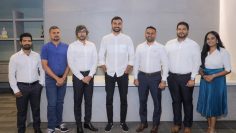
Samsung Unlocks Intuitive, Personalized and Secure Experiences for Developers at SDC23
Samsung’s annual Developer Conference (SDC) highlighted the latest multi-device experiences and services enabled by cross-platform and a truly connected ecosystem
Samsung Electronics held its annual Samsung Developer Conference (SDC) today at the Moscone Center in San Francisco. Now in its ninth conference, the developer and partner event focused on Samsung’s commitment to open innovation and service strategy while highlighting its platforms including Bixby, Samsung Knox, SmartThings and Tizen for developers.
During the keynote, Samsung introduced new ways to create safer, healthier and more sustainable experiences through its multi-device ecosystem, which has been particularly enhanced by new SmartThings connectivity features and an updated Samsung Knox Matrix. The event also spotlighted One UI 6, the latest version of its class-leading mobile user interface, featuring an array of personalized styles and new features for an all-around smartphone experience.
“Over 500 million Samsung products are sold every year, and the number of people using Samsung accounts exceeds 600 million. To us, this is both a huge achievement and a profound responsibility,” said Jong-Hee (JH) Han, Vice Chairman, CEO and Head of Device eXperience (DX) Division at Samsung Electronics. “Samsung’s technologies connect countless people, products and services. I believe that if you — our developers and partners — join this journey of innovation, we can create greater opportunities and a brighter future together.”
CEO JH Han also emphasized that sustainability and security are the foundation to all of Samsung’s latest updates, as both values are essential for innovating responsibly in a new age of hyperconnectivity.
Smart Homes More Connected Than Ever
Samsung’s vision of the connected home is deeply rooted in SmartThings and open innovation. Since applying the Matter standard last year, the total number of SmartThings users who have connected compatible products and services has increased to over 290 million. Now, the SmartThings Home API1 makes it easier than ever for developers to create SmartThings-based apps, and the SmartThings Context API provides new ways to leverage AI and sensing technology for better user experiences.
Samsung is embedding SmartThings Hub functionality into existing and new products, including Samsung Sound Bars and Smart TVs, so users can quickly and easily start their smart homes from their connected devices. This Multi-Hub Network also means when it’s time to replace or add a device, there is a powerful and stable network of others ready to keep the smart home continue. These experiences are enhanced further with Samsung’s work with Aqara, who joined Samsung onstage to share how its Internet of Things (IoT) sensors work with SmartThings to create more intuitive and accessible smart homes.
Samsung also announced the second-generation SmartTag2 at SDC23. With battery life lasting up to 700 days,2 an IP67 rating for water and dust resistance and a streamlined and smaller design, the SmartTag2 can follow lost items through rain, snow, and even underground with Bluetooth Low Energy (BLE) connectivity.
Bixby is increasingly integrating with SmartThings. This year, Samsung announced more intuitive command control for multi-device environment. Now, even if multiple devices are connected in the same space, Bixby intuitively understands which device is best suited to each command, with a deeper understanding of every scenario. In the future, Bixby will evolve to provide personalized experiences with simple commands by understanding users’ languages widely and optimizing their intentions.
As a growing number of connected devices come together to build these new experiences, security and privacy is more important than ever. Last year, Samsung introduced Knox Matrix, Samsung’s blockchain-based security vision for a future wherein devices connected in an ecosystem can protect each other — as well as their users. This year, Samsung is updating Knox Matrix’s key features including Credential Sync and Trust Chain. Samsung is also bringing Knox Vault to more devices including Samsung Neo QLED 8K TVs in 2023 and select Galaxy A series smartphones that launch with One UI 6 or later in 2024. Engineered for an age of hyperconnectivity, these advancements enable greater convenience and choice for users, empowering them with added ways to safely do what they love.
Tizen OS: Maximizing Developer Opportunities
Over the past decade, Tizen has effectively powered digital screens including TVs, home appliances, monitors and signs. This year, Samsung announced that Tizen is coming to even more devices including home appliances with a 7-inch screen while also boosting experiences with on-device AI and the Home AI Edge Hub. With Home AI Edge technology, appliances with lower computing power can request AI services to the devices in the house with strong computing resource such as CPUs and NPUs. This will ultimately make all devices in the home intelligent.
Tizen is also powering Samsung’s immersive gaming experiences, including the Samsung Gaming Hub which now supports 3,000 games on the cloud platform — a 300% increase since it was launched last year. And, with HDR10+ GAMING and Samsung’s IRIS tool for graphics developers, there’s never been a better time to explore the virtual worlds of gaming on Tizen.
Tizen is also offering increased support for the rising open-source semiconductor architecture RISC-V and the programming language RUST, alongside new features like the Remote Test Lab to test apps and experiences on Samsung TV devices in the cloud.
One UI 6: Enabling Your Galaxy, Your Way
The new One UI 6 offers more ways to make your smartphone experience easier to navigate, simpler to manage and a little more you. It includes a revamped Quick panel with a refreshed, intuitive look and feel with settings grouped together for easier use. With One UI 6 a new exclusive typeface has also been introduced: One UI Sans, to improve readability on digital screens. For photos, One UI 6 analyzes the photo you are viewing and suggests the most relevant AI editing tools all within one easy to access tool. And with Samsung Studio, you can make multi-layered edits to your video like adding text, stickers, and music exactly where and when you want within the video.
With its ability to provide a personalized and intuitive user experience alongside streamlined capabilities, One UI 6 truly lets users get more out of their smartphones than ever before.
Taking Health Care to the Next Level
Samsung Electronics further used SDC23 to share its enhanced health solutions based on the power of connectivity. New digital health experiences provided by SmartThings and Samsung Food, and a personalized sleep environment are enabled through the better connection of users, devices and services. To build on these experiences, Samsung announced its continued commitment of the Samsung Privileged Health SDK, which enables developers and partners to create digital health solutions using the Samsung BioActive Sensor.
Additionally, Samsung highlighted its latest clinical research collaborations with Brigham & Women’s Hospital, the MIT Media Lab, Tulane University and Samsung Medical Center with MIT Media Lab’s Dr. Pattie Maes joined Samsung onstage.

Samsung also shared more details of its new Samsung Food service, including the Food AI and Vision AI technologies, which offer a comprehensive food experience across all connected devices. This includes a creator program for recipe-sharing and services for grocery purchases, personalized recommendations, and more. Samsung plans to offer Samsung Health integration with Samsung Food so that users will be able to receive suggestions for diet management.
As Sri Lanka’s No. 1 smartphone brand, Samsung has been honored with the prestigious title of ‘People’s Youth Choice Brand of the Year’ for four consecutive years by SLIM Sri Lanka’s review of the country’s most valuable brands. With a vast customer base encompassing all age groups, Samsung’s dedication to meeting the needs of the Gen Z and Millennial segments remains unwavering.




